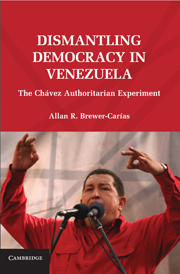Book contents
- Frontmatter
- Contents
- AUTHOR'S NOTE
- INTRODUCTION DEFRAUDING DEMOCRACY THROUGH NONCONSENSUAL CONSTITUENT ASSEMBLIES
- PART ONE THE POLITICAL ASSAULT ON STATE POWERS AND THE FRAMEWORK FOR AUTHORITARIANISM
- PART TWO INSTITUTIONAL DEVELOPMENT TOWARD CONSOLIDATING AUTHORITARIANISM
- Chapter 5 CONSTITUTIONAL FRAUD AND DEFRAUDING DEMOCRACY
- Chapter 6 THE REINFORCED CENTRALIZATION OF THE FEDERATION
- Chapter 7 CONCENTRATION OF POWERS AND AUTHORITARIAN GOVERNMENT
- Chapter 8 THE CATASTROPHIC DEPENDENCE AND POLITICAL SUBJECTION OF THE SUPREME TRIBUNAL OF JUSTICE
- Chapter 9 STATE APPROPRIATION, NATIONALIZATION, EXPROPRIATION, AND CONFISCATION OF PRIVATE ASSETS
- PART THREE CONSTITUTIONAL REFORMS DESIGNED TO CONSOLIDATE AUTHORITARIANISM
- INDEX
Chapter 7 - CONCENTRATION OF POWERS AND AUTHORITARIAN GOVERNMENT
Published online by Cambridge University Press: 05 June 2012
- Frontmatter
- Contents
- AUTHOR'S NOTE
- INTRODUCTION DEFRAUDING DEMOCRACY THROUGH NONCONSENSUAL CONSTITUENT ASSEMBLIES
- PART ONE THE POLITICAL ASSAULT ON STATE POWERS AND THE FRAMEWORK FOR AUTHORITARIANISM
- PART TWO INSTITUTIONAL DEVELOPMENT TOWARD CONSOLIDATING AUTHORITARIANISM
- Chapter 5 CONSTITUTIONAL FRAUD AND DEFRAUDING DEMOCRACY
- Chapter 6 THE REINFORCED CENTRALIZATION OF THE FEDERATION
- Chapter 7 CONCENTRATION OF POWERS AND AUTHORITARIAN GOVERNMENT
- Chapter 8 THE CATASTROPHIC DEPENDENCE AND POLITICAL SUBJECTION OF THE SUPREME TRIBUNAL OF JUSTICE
- Chapter 9 STATE APPROPRIATION, NATIONALIZATION, EXPROPRIATION, AND CONFISCATION OF PRIVATE ASSETS
- PART THREE CONSTITUTIONAL REFORMS DESIGNED TO CONSOLIDATE AUTHORITARIANISM
- INDEX
Summary
THE SEPARATION OF POWERS IN MODERN CONSTITUTIONALISM AND THE VENEZUELAN CONSTITUTIONAL TRADITION
The principle of separation of powers in modern constitutionalism has its origin in the constitutions of the former colonies of North America. For example, the Constitution of Virginia of June 29, 1776, set forth the following:
SEC. 3. The legislative, executive, and judiciary department, shall be separate and distinct, so that neither exercise the powers properly belonging to the other: nor shall any person exercise the powers of more than one of them, at the same time.
This provision and similar ones incorporated after 1776 in other constitutions of the former colonies of North America have their theoretical backgrounds in the writings of Locke, Montesquieu, and Rousseau, which were the most important weapons used during the eighteenth-century American and French revolutions in the battle against the absolute state – in North America to fight against the sovereignty of British Parliament, and in France to fight against the sovereignty of the monarch. The consequence of both revolutions was the replacement of the absolute state by a constitutional state, subject to the rule of law, based precisely on separation of powers as a guarantee of liberty, although with different trends of government: the presidential system of government in the United States resulting from the American Revolution and, decades after the French Revolution, the consolidation of the parliamentary system of government in Europe.
Separation of powers thus became the most important and distinguishing principle of modern constitutionalism.
- Type
- Chapter
- Information
- Dismantling Democracy in VenezuelaThe Chávez Authoritarian Experiment, pp. 212 - 225Publisher: Cambridge University PressPrint publication year: 2010



